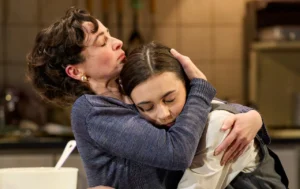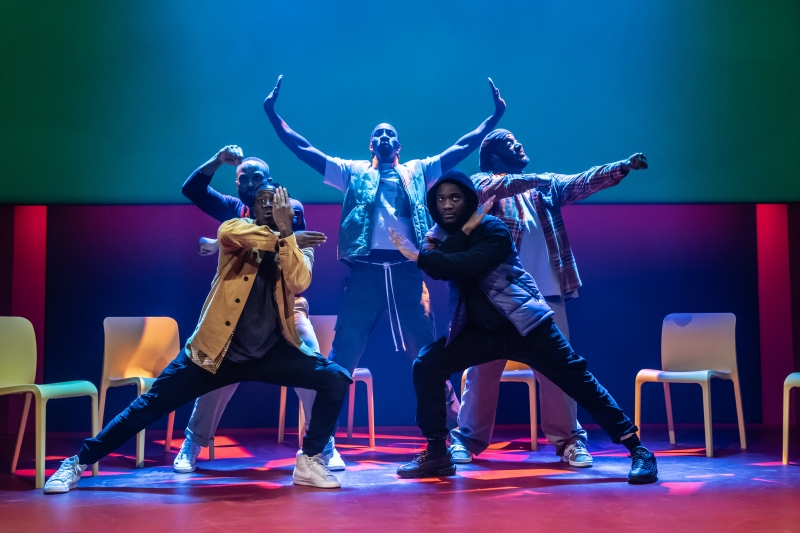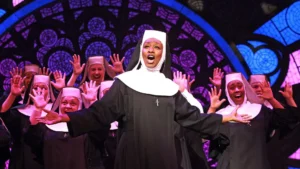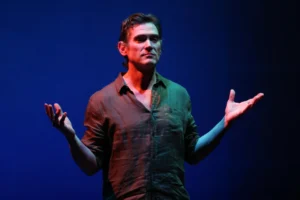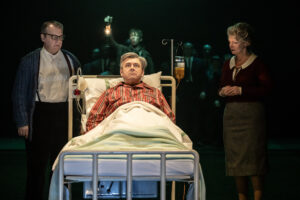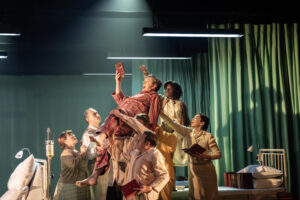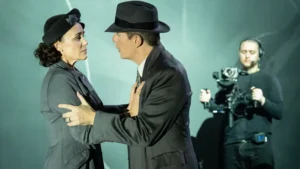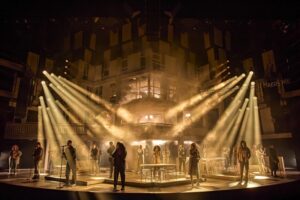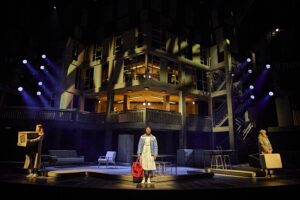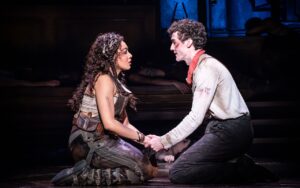Theatre Royal Haymarket
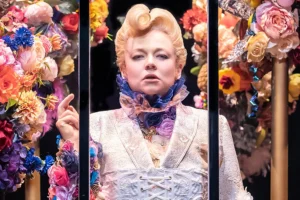
High praise for Sarah Snook and The Picture of Dorian Gray but the high prices brought down the Value Rating. The Succession star’s virtuoso performance as 26 different characters was matched by a dazzling production from Kip Williams featuring live and recorded video on screens.
[Links to full reviews are included but a number are behind paywalls, and therefore may not be accessible]
Describing it as ‘tinglingly virtuoso and startlingly dangerous’ in her Guardian (5★) review, Arifa Akbar said it is ‘a true high-wire act, not only because of Snook’s fleet and fabulous performance but also because of the accompaniment of screens, pre-recorded footage, live film crew, and orchestration of technology that is as dazzling as it is complicated, heightening theatricality rather than distracting from it.’ She concluded: ‘It is all beautiful, brilliant, maniacally unmissable.’ Dominic Cavendish in The Telegraph (5★) was impressed by the production and the star: ‘Snook doesn’t shortchange us on a chameleonic tour de force that flips genders as fast as pancakes,’ he said. She ‘holds us in thrall, inhabiting all 26 characters in Kip Williams’ adaptation, narrating as she goes. Her shape-shifting is magnified by the live-filming of her every move.’
Sarah Hemming in The Financial Times (5★) called the show ‘a virtuoso performance in an astonishing piece of theatre.’
Fiona Mountford in the i (5★) said Sarah Snook gives ‘two hours of unceasing acting dynamite.’ The reviewer was impressed when, ‘At one point, she chats at a lunch party to six other versions of herself. This impeccable technological feat, so fraught with potential peril, unfolds without a single glitch.’ Stefan Kyriazis in The Express (5★) said Ms Snook gave ‘a fiercely fearless, full-throttle, utterly exposed display’. Top marks for Ms Snook from Helen Hawkins at The Arts Desk (5★) too: ‘She is a hugely engaging stage presence, not merely a versatile trouper but a subtle, funny actress who conspiratorially draws you into the piece’. The production, she said, is ‘a dazzling display of virtuoso acting and technical wizardry.’
Time Out‘s (4★) said it was ‘a dizzying technical masterpiece, boasting a tour-de-force performance from Sarah ‘Shiv Roy’ Snook.’ His reservation is that it’s ‘exhilarating but shallow’. ‘Snook shows us sweat, snot and desperation in unforgiving close-up’ said Nick Curtis in The Standard (4★) in what he called ‘a technically adroit and complex production.’ ‘Her extreme, carnivalesque performance here is like nothing else I’ve ever seen.’ Sarah Crompton over at Whats On Stage (4★) is just as enthusiastic about Ms Snook: ‘Her confidence on stage is breathtaking; she owns the space, elegantly playing with all the technology, never being drowned by it. Given how big the effects around her sometimes are, how broad the comedy and sweeping the melodrama, she acts with remarkable subtlety and sensitivity.’
Alice Saville in The Independent (4★) found the production ‘full of magical transformations, sensory splendour and technical ingenuity.’ For her, Ms Snook conveys ‘raw, human misery, only heightened by the artifice that surrounds it.’ Alice Saville Sam Marlowe in The Stage (4★) described it as ‘a riot of language, images and ideas, a full-on sensual assault’. ‘Snook’s phenomenal turn,’ she said, ‘involves her portraying not just Dorian, but all the other characters too, often simultaneously – a split-second technical feat achieved with a kaleidoscopic use of live and recorded video, designed by David Bergman.’
After all of the above, Clive Davis seems almost miserly with his 3 star review in The Times (3★). While admitting that he ‘can’t help marvelling at the energy and concentration she (Sarah Snook) displays’, he told us: The production is ‘wallowing in camp’…’with next to no variation in tone: for all the bravura camerawork, we might as well be watching the Victorian equivalent of Acorn Antiques.’ He concluded: ‘This show may be a glimpse of the technological future of theatre, but as storytelling, it’s old hat.’
Average rating 4.4★
Value Rating 36 (Value rating is the Average critic rating divided by the most common Stalls ticket price. In theory, this means the higher the score the better value but, because of price variations, a West End show could be excellent value if it scores above 40 while an off-West End show may need to score above 60. This rating is based on opening night prices- theatres may raise or lower prices during the run.)
The Picture of Dorian Gray is at the Theatre Royal Haymarket until 11 May 2024. Buy tickets direct here
If you’ve seen The Picture of Dorian Gray you are welcome to add your review and rating below (but we ask that you keep it relevant and polite)
